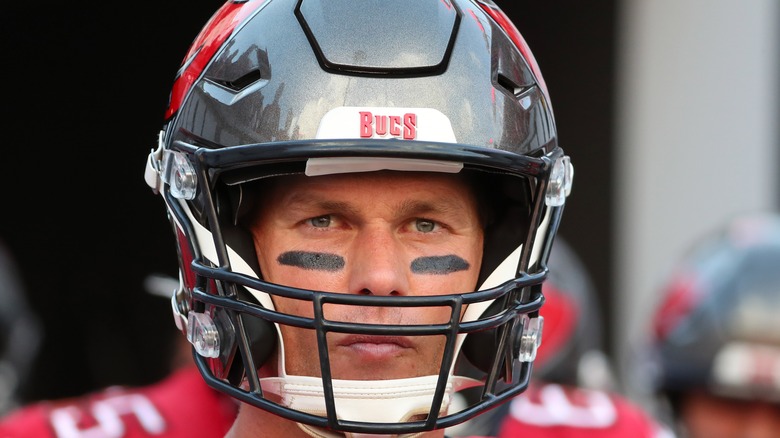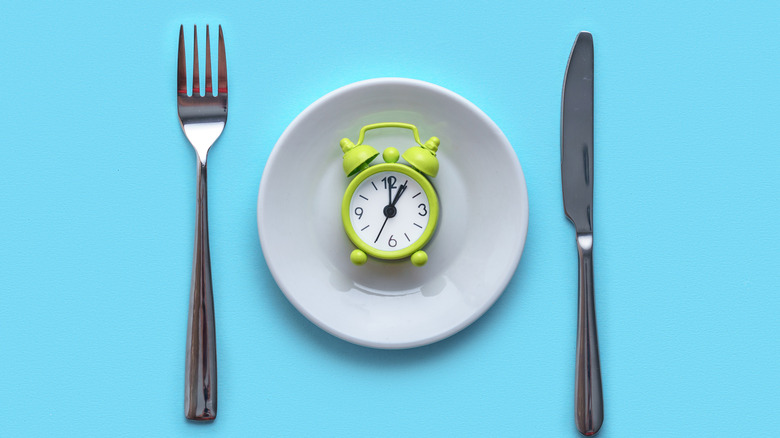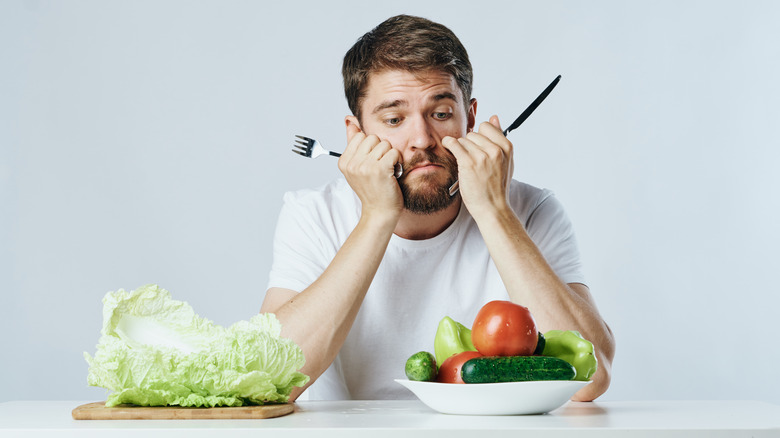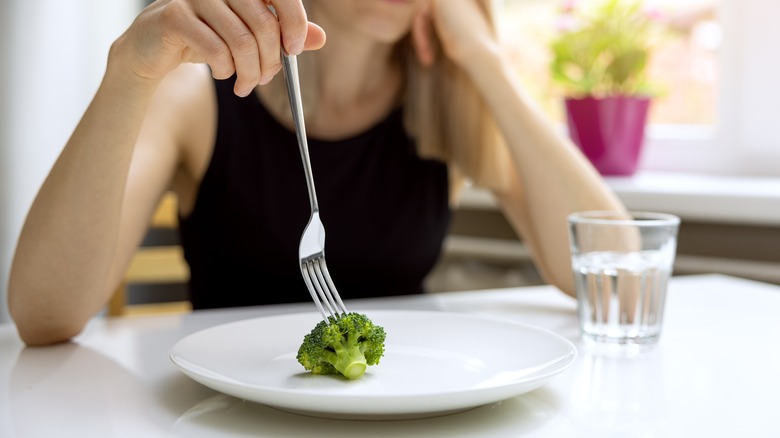Why You Should Think Twice Before Trying Tom Brady's TB12 Diet
We can confidently claim that NFL star Tom Brady has successfully cemented a name for himself in the sports world. As impressed as we are with his athletic skills, we're also wowed by his longevity. And this is where Brady is making a name for himself in the world of dieting.
The longtime champion credits his successful career to his own diet, the TB12 diet. "It really doesn't matter how much exercise you do," Brady writes in his 2017 diet and exercise book, "The TB12 Method" (via Vox), "if you're not eating the right food and providing your body the right nutrients." But before you decide to try this way of eating in an effort to score your own personal touchdowns, please think twice before doing so.
Brady's self-developed diet has some strict rules
Firstly, it can't be denied that Brady eats healthy foods. It's what he doesn't eat on the whole-foods-based TB12 diet that would likely make loyal fans and diet plan followers struggle. A Vox interview with Brady's chef, Allen Campbell, revealed that the football star followed an anti-inflammatory diet that can only be described as extremely restrictive. "No white sugar. No white flour. No MSG. I'll use raw olive oil, but I never cook with olive oil. I only cook with coconut oil. Fats like canola oil turn into trans fats. ... I use Himalayan pink salt as the sodium," says Campbell. "I never use iodized salt. ... What else? No coffee. No caffeine. No fungus. No dairy," he adds.
In addition to being very restrictive, Brady's self-developed diet has some strict rules. Healthline shares that there is no eating at least three hours before bed. You shouldn't eat fruits combined with other foods. And while you should be drinking half your body weight in ounces of water daily, don't do your sipping — or chugging — immediately before, during, and after meals.
The TB12 diet is not supported by scientific evidence
Brady focuses on eating a lot of lean meats and healthy fruits and vegetables. This is all well and good. What nutrition experts have an issue with is that the football star claims his diet will help make the body less acidic, thus promoting bone health and boosting energy. This premise lacks very little supporting evidence. "In many ways, the TB12 diet is similar to the alkaline diet," Dr. Mike Molloy, a nutrition coach for athletes at M2 Performance Nutrition tells Insider. "In both cases, the goal is to reduce the acidic nature of the body through food. There's only one problem: The body does this naturally through the function of the kidneys and urine. This is just one way in which the diet really fails to follow the actual science of nutrition," he explains.
Brady's athletic ability and accomplishments in the world of sports are impressive. His own TB12 diet may be helping him with his day job. But for those of us sitting in the audience, the lack of scientific evidence, strict rules, and extreme restrictiveness may make it difficult for us to score our own health-related touchdowns with the TB12 method.
The TB12 diet might affect your wallet
While many of us would love to have the same yearly income as the second highest-paid football player in NFL history, according to Business Insider, it's safe to assume Tom Brady's weekly grocery budget looks a little different than ours. With that being said, Verywellfit reports that Brady almost exclusively eats organic food that is locally sourced.
In order for food to be considered organic, it must be produced without the use of artificial chemicals, hormones, antibiotics, and genetically modified organisms (per Healthline). While there is some evidence that suggests eating organic may be beneficial to your health, organic foods often tote a higher price tag. In a 2015 study that compared the price of over 100 organic products with their non-organic counterparts, Consumer Reports concluded that on average, organic foods were 47% more expensive. On top of that, Brady uses higher-priced products like coconut oil and Himalayan salt, the latter of which is described by Business Insider as costing up to 20 times more than generic table salt. While the difference might not seem like much when you're putting individual products in your shopping cart, the higher price of these ingredients tends to add up, potentially raising the cost of your weekly grocery haul.
Restrictive dieting poses some health risks
Yahoo Sports reports that Brady follows a mostly plant-based diet, aiming to have 80% of his calories come from plants and the other 20% from animal-based protein. Registered dietitians have noted that adding some animal protein is a wise compromise, as a plant-based diet does not come without risk. Without vigilance, a vegan diet can leave your body missing essential nutrients like calcium and iron. A 2019 study published in BMJ found that people following vegetarian and vegan diets are at higher risk of stroke than meat eaters, possibly due to low intake of certain vitamins. Those following the TB12 diet who lean into the plant-based element should take care in making sure their body is getting all the nutrients it needs.
A diet as restrictive as the TB12 also demands that a great deal of attention be paid to what and when you can eat. According to Australia's National Eating Disorders Collaboration, disordered eating lives on a spectrum — sitting somewhere between normal eating and eating disorders – and can present in many ways, including restrictive eating, compulsive eating, or inflexible eating habits. In a 2012 article released by the National Eating Disorders Association, it was reported that 35% of "normal dieters" progress to pathological dieting, and of those, 20-25% further progress to partial or full eating disorders.





